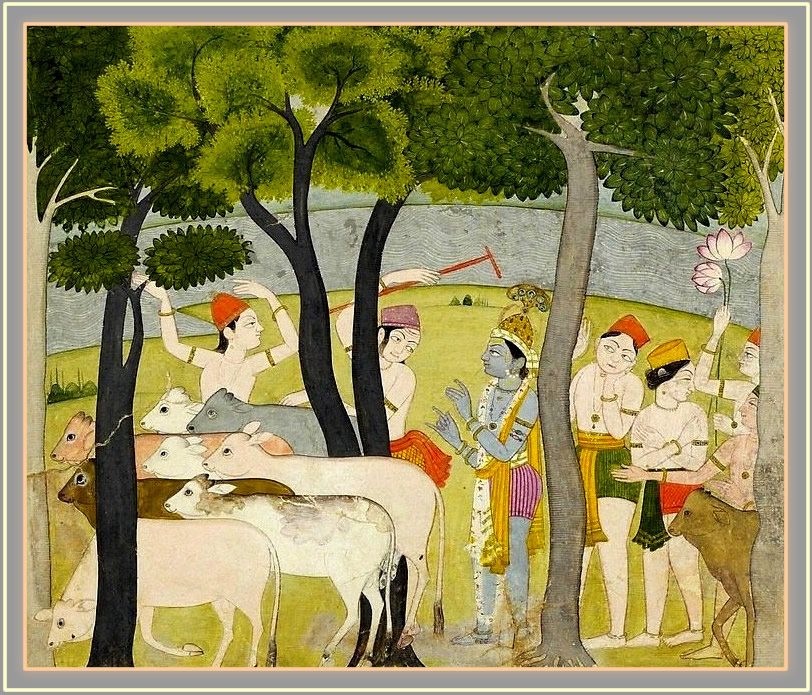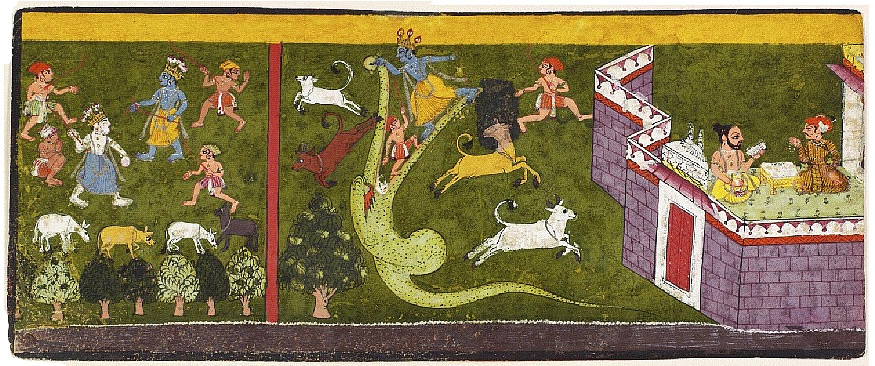Chapter 12: The Killing of the Demon Aghâsura
(1) S'rî S'uka said: 'One day the Lord decided to have a picnic in the forest. Rising early He blew His horn nicely to wake up His comrades and the calves. Then they departed from Vraja driving their groups of calves in front of them. (2) It offered a most attractive sight to see them all happy and beautifully together as they walked out in His company with their prods, horns, flutes and the many calves each of them had. All together they numbered over a thousand. (3) With Krishna's personal calves added to them they could not be counted anymore. Immersed in their children's games, the boys had a good time in different places [in the forest].
(4) Even though they were already adorned with gems, shells, gold and pearls, they also used fruits, green leaves, bunches of beautiful flowers, peacock feathers and colored minerals to decorate themselves. (5) They snatched away each other's belongings and threw them at a distance when it was discovered. Others threw them further away, but then again they were returned with a laugh. (6) When Krishna walked away to admire the beauty of the forest, they enjoyed it to say 'me first, me first' while they touched Him. (7-11) Some blew their flutes, some vibrated their horns, some hummed along with the bumblebees and others imitated the cuckoos. Some ran after the shadows of the birds, some walked elegantly with the swans or sat with the ducks just as silent or danced with the peacocks. They searched for young monkeys and hopped along with them between the trees as they were skipping from tree to tree. They jumped together with the frogs, getting wet in the water, they laughed at their shadows and mocked their own echoes. This way they enjoyed the merit of their previous lives in friendship with Him who is the Supreme Divinity for those who are entangled in mâyâ, He who is the spiritual happiness for those transcendentalists who accept it to be of service [as a consequence thereof. See * and 1.1: 2, 1.7: 6 and 2.1: 6]. (12) Yogis skilled in self-control do not even after many lives of doing penance achieve the dust of His lotus feet. How fortunate then are the inhabitants of Vraja for whom He became the object of their vision by personally being present?
(13) And then the one named Agha ['the evil one'] appeared on the scene, a great demon who could not tolerate the sight of their happy pastimes. His life's end was awaited by all the immortal souls, in spite of the nectar they drank. (14) When Aghâsura, who was sent by Kamsa and who was the younger brother of Bakî [Pûtanâ] and Bakâsura, saw the boys who were lead by Krishna, he thought: 'This must be the killer of the two who together with me took birth from the same mother. Let me therefore now for their sake, kill Him and His boys! (15) When these boys have become the sesame and water for the funeral rites of my brother and sister, when the strength of the life of the inhabitants of Vraja [their children] has disappeared, when these living beings whom they consider the very embodiment of their love and breath have left them, they all will be as good as dead.' (16) Thus having decided he assumed the wondrous form of a very, very large python that extended for miles. Therewith he occupied, as high as a mountain and with a mouth spread wide open like a mountain cave, that moment most wickedly the road in order to swallow the picnickers. (17) Keeping his mouth wide open, his lower lip rested on the earth and his upper lip touched the sky. His teeth were like mountain peaks, the inside was pitch dark, his tongue resembled a broad road, his breath was like a warm wind and his fiery look was like a fire. (18) Seeing him in that position they all considered it Vrindâvana at its best. It was for them a known game [to act] as if they were looking at the form of a python's mouth: (19) 'Look dear friends! A dead python there before us, ready to swallow us all with its snake mouth spread open, is it not? (20) It is obvious, really, that cloud up there is the upper lip and below, that big sand bank with that reddish glow, is his lower lip... (21) On the left and right, those caves, look just like the corners of the mouth and those peaks there, are exactly like the animal's teeth. (22) The length and breadth of the broad path, is like the tongue and the darkness, in between the mountains, looks like the inside of its mouth. (23) Just notice how that hot wind blowing from a forest fire is like its breath, and the bad smell of the flesh of the burned corpses, stinks like the flesh within its belly. (24) Would this animal be here to devour all who dare to enter? With that being so, he will, just like the heron, be immediately vanquished by Krishna!' so they said, looking at the gleaming face of Him, Baka's enemy, while they loudly laughing and clapping their hands entered its mouth.
(25) Krishna heard them talking this and that way besides the truth. They did not realize what they were dealing with. He knew that the Rakshasa was very real and was deceiving them and so He arrived at the conclusion that He, the Supreme Lord, the Complete Whole of All Living Beings who is situated in the heart, should stop His comrades. (26) Meanwhile, all the boys and their calves had entered the belly of the demon, but they were not devoured. The Rakshasa who was thinking of his dead relatives, waited for Baka's enemy to enter. (27) Krishna, who for each and everyone is the source of fearlessness, was amazed to witness that and compassionately felt sorry about this twist of fate. They who had no one but Him now helplessly had moved away from His control to burn as straws in the fire of the belly of Aghâsura, death personified. (28) What to do now? This rogue should not exist, nor should the innocent and faithful ones find their end. How could He achieve both ends at the same time? Gathering His thoughts the Lord, the Unlimited Seer, knew what to do and entered the mouth. (29) That very moment all the gods exclaimed from behind the clouds in fear 'Alas, alas!' and Kamsa and the other bloodthirsty friends of Aghâsura rejoiced. (30) When He heard that, Krishna, the Supreme Lord who is never vanquished, immediately expanded Himself [see siddhi] within the throat of the demon who tried to crush the boys and the calves in his belly. (31) With that action the airways were blocked and the eyes of the squirming and wrestling giant popped out. The life air was arrested within the internally completely obstructed body and then broke out through the top of the skull. (32) After all life air had left the body and Krishna saw that the boys and calves lay dead, He, Mukunda, the Supreme Lord, brought them back to life whereupon He reappeared from the mouth in their company. (33) From the body a most wonderful bright light issued that all by itself illumined the ten directions. It remained in the sky waiting until the Supreme Personality appeared and then, before the eyes of the demigods, it entered His body [sâyujya-mukti]. (34) Everyone most pleased thereupon performed his specific service of worship [see also 1.2: 13]: flowers were showered, the singers of heaven sang, the heavenly girls danced, the demigods played their specific instruments and the brahmins offered prayers. (35) The Unborn One [Lord Brahmâ] who nearby in his abode heard the wondrous sounds of those for everyone so very auspicious prayers, sweet sounds, songs and different celebrations, came immediately and stood amazed to see the glory of the Supreme Master.
(36) Oh King, after the skin of the python had dried, it became a place of interest for the inhabitants of Vrindâvana that for a long, long time afterwards was used as a cave. (37) This incident - of the snake's death and deliverance and the liberation of Him and His associates - that took place when the Lord was five years old [kaumâra], was by the boys in Vraja disclosed one year later [pauganda] as if it had happened that very day. (38) However unthinkable it might be for an impure soul, it is not that astonishing that even Aghâsura was liberated from all contamination and [with the light of his soul] could merge with the Supersoul. All he had to do was to associate but for a moment with the Supreme Creator of a higher and lower existence, when He assumed the form of a human child. (39) This destination He even grants those who [like Aghâsura] but once got innerly connected to His form because of a certain state of mind in relation to His divinity [thus even being connected in hatred]. What then would that mean for those in whom He is ever present as the remover of illusion, as the One who always grants each and every soul the realization of transcendental happiness?' "
(40) S'rî Sûta [see 1: 12-15] said: "He [Parîkchit] who was protected by the God of the Yadus [Yâdavadeva or Krishna] and who this way oh twice-born one, heard about the so very wonderful activities of his savior [see 1.8], thus being fixed in his consciousness asked the son of Vyâsa for more about these meritorious deeds. (41) The honorable king said: 'Oh brahmin how could what happened in the past, be described as having happened in the present? How can that be possible? How could what the Lord did at the age of five years by the boys be described as having occurred at His sixth? (42) Oh great yogi, I am burning with curiosity. Please, explain this incident to me oh guru, I am certain that it was caused by nothing but the deluding potency of the Lord [yoga-mâyâ]. (43) In this world oh teacher, we as a mundane ruler are most blessed with the opportunity to always drink from the nectar of your sacred talks about Krishna.' "(44) S'rî Sûta said: "When the man of penance this way was questioned by him, he had completely lost contact with his senses the very moment that he was reminded of the Infinite One. After with difficulty slowly having regained his external vision, he answered the Lord's most outstanding, finest adherent."



